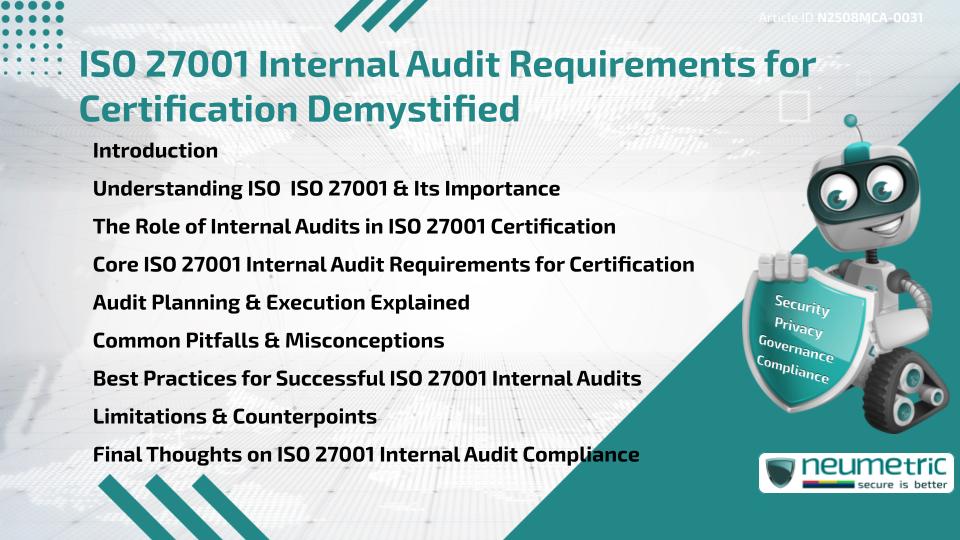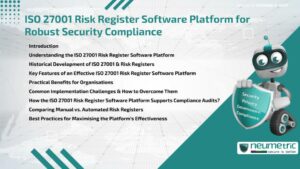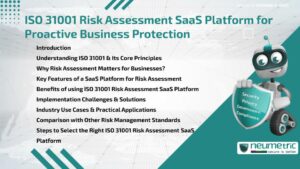Table of Contents
ToggleIntroduction
The ISO 27001 Internal Audit requirements for Certification form a crucial part of any organisation’s journey toward compliance with the International organisation for Standardization’s flagship Information SecurityStandard. At its core, ISO 27001 focuses on creating a well-structured Information Security Management System [ISMS] that ensures Confidentiality, Integrity & Availability of Data. However, simply having an ISMS is not enough; it must be Audited internally to identify Non-Conformities, Gaps & Improvement Opportunities. This article unpacks the key requirements, common challenges & essential Best Practices for meeting the ISO 27001 Internal Audit requirements for certification, helping Organisations approach compliance with clarity & confidence.
Understanding ISO ISO 27001 & Its Importance
ISO 27001 is an internationally recognized Standard that outlines how to manage Information Security.. It provides a Framework for establishing, implementing, maintaining & continually improving an ISMS. Certification to this Standard proves that an organisation takes Data ProtectionData Protection seriously.
An Internal Audit is a mandated component under Clause 9.2 of ISO ISO 27001, which requires that Internal Audits be conducted at planned intervals to ensure the ISMS conforms to organizational requirements & the ISO ISO standard. Without these Audits, Certification Bodies will not approve compliance.
Learn more from ISO on the ISO 27001 standard.
The Role of Internal Audits in ISO 27001 Certification
Internal Audits serve as a self-check mechanism before a Third Party Certification body conducts an External Audit. These Audits:
- Evaluate conformity with ISO 27001 requirements.
- Verify that Security Controls are implemented & effective.
- Identify & Non-Conformities & Opportunities for Improvement.
- Confirm that Corrective Actions from past Audits have been addressed.
Conducting a thorough & objective Internal Audit is not just a checkbox exercise. It helps strengthen the ISMS & builds confidence in readiness for certification.
Core ISO 27001 Internal Audit Requirements for Certification
The ISO 27001 Internal Audit requirements for Certification are clearly outlined in the standard, especially under Clause 9.2. Key expectations include:
- Planning: Develop an Internal Audit program that considers the importance of processes & results of previous Audits.
- Execution: Ensure Audits are objective & impartial, preferably by someone not responsible for the Audited area.
- Reporting: Document results accurately & share them with relevant management.
- Follow-up: Address Non-Conformities with Corrective Actions & Corrective Actions & monitor their effectiveness.
Also, per Annex A of ISO 27001, controls related to Audit processes must be reviewed, such as logging, monitoring & Control Implementation.
Audit Planning & Execution Explained
Effective Audit planning includes:
- Defining Audit Scope & Objectives.
- Identifying competent Auditors.
- Scheduling Audits across relevant departments.
- Using checklists aligned with ISO 27001 Clauses & Controls.
During execution, Auditors should:
- Conduct opening meetings to explain objectives.
- Collect objective evidence through interviews & Document reviews.
- Record observations factually.
- Hold closing meetings to present findings.
A balanced approach, one that is both critical & constructive encourages transparency & trust among team members.
Common Pitfalls & Misconceptions
Many OrganisationsOrganisations struggle with the Internal Audit phase due to the following:
- Assuming Internal Audits can be skipped before certification.
- Over-reliance on Templates without tailoring Audits to their ISMS.
- Assigning Audits to biased staff who oversee the processes.
- Lack of follow-up, where Audit Findings are not resolved effectively.
Another frequent mistake is not aligning the Internal Audit program with real business Risks. Internal Audits should reflect how the ISMS functions in actual practice.
Best Practices for Successful ISO 27001 Internal Audits
To succeed in meeting ISO ISO 27001 Internal Audit requirements for certification, Organisations should adopt the following practices:
- Train Internal Auditors on ISO 27001 principles & Auditing skills.
- Use Risk-based planning to focus on critical areas.
- Separate Audit roles to ensure impartiality.
- Maintain records of all Audit activities.
- Engage Top Management to act on findings & promote improvements.
Successful Audits are more than compliance checks; they are strategic tools for strengthening Data Governance.
Limitations & Counterpoints
While Internal Audits are essential, they are not without limitations:
- Resource constraints may limit Audit scope or frequency.
- Bias & internal politics can affect objectivity.
- Audit fatigue may occur if Audits are too frequent or repetitive.
Additionally, Internal Audits may miss issues that external Certification Bodies could identify. This is why Internal Audits should be complemented with management reviews & occasional external gap assessments for a well-rounded approach.
Final Thoughts on ISO 27001 Internal Audit Compliance
Understanding & implementing the ISO 27001 Internal Audit requirements for Certification is a foundational step toward building a secure & compliant Organisation. By committing to objective & structured Internal Audits, Organisations not only meet Certification demands but also enhance their Information Security resilience. The key lies in treating Audits not as administrative burdens but as catalysts for improvement.
Takeaways
- ISO 27001 requires Internal Audits as part of compliance & certification.
- Clause 9.2 highlights Audit planning, execution & of the Audit & needs of reporting.
- Effective Audits are impartial, well-documented & followed up with Corrective Actions.
- Common pitfalls include insufficient planning, biased Auditing & ignoring findings.
- Best Practices include training, Risk-based Auditing & clear communication.
FAQ
What is the requirement of the Internal Audit in ISO 27001 Certification?
An Internal Audit ensures the ISMS complies with ISO 27001 requirements & helps identify areas for improvement before the Certification Audit.
How often should Internal Audits be conducted for ISO 27001?
Internal Audits must be conducted at planned intervals, usually annually or based on Risk, organizational changes & past Audit results.
Who should conduct ISO 27001 Internal Audits?
Audits must be conducted by trained personnel who are independent of the area being Audited to maintain objectivity & credibility.
Are Internal Audits mandatory for ISO 27001 Certification?
Yes, Internal Audits are mandatory & required under Clause 9.2 to achieve & maintain ISO 27001 Certification.
Can an organisation perform its own ISO 27001 Audit?
Yes, provided the Audit is impartial & conducted by someone not directly responsible for the processes being Audited.
What documents are needed for an Internal Audit?
Audit plans, checklists, evidence records, nonconformity reports & management reports are essential documents for the Internal Audit process.
What happens if Non-Conformities are found during the Internal Audit?
They must be documented, Corrective Actions planned & implementation tracked to ensure they are resolved effectively.
Do Internal Audits need to cover all ISO 27001 controls?
Not necessarily all at once, but over time, the Audit program should cover the entire ISMS including applicable controls in Annex A.
References
Need help for Security, Privacy, Governance & VAPT?
Neumetric provides organisations the necessary help to achieve their Cybersecurity, Compliance, Governance, Privacy, Certifications & Pentesting needs.
Organisations & Businesses, specifically those which provide SaaS & AI Solutions in the Fintech, BFSI & other regulated sectors, usually need a Cybersecurity Partner for meeting & maintaining the ongoing Security & Privacy needs & requirements of their Enterprise Clients & Privacy conscious Customers.
SOC 2, ISO 27001, ISO 42001, NIST, HIPAA, HECVAT, EU GDPR are some of the Frameworks that are served by Fusion – a SaaS, multimodular, multitenant, centralised, automated, Cybersecurity & Compliance Management system.
Neumetric also provides Expert Services for technical security which covers VAPT for Web Applications, APIs, iOS & Android Mobile Apps, Security Testing for AWS & other Cloud Environments & Cloud Infrastructure & other similar scopes.
Reach out to us by Email or filling out the Contact Form…





